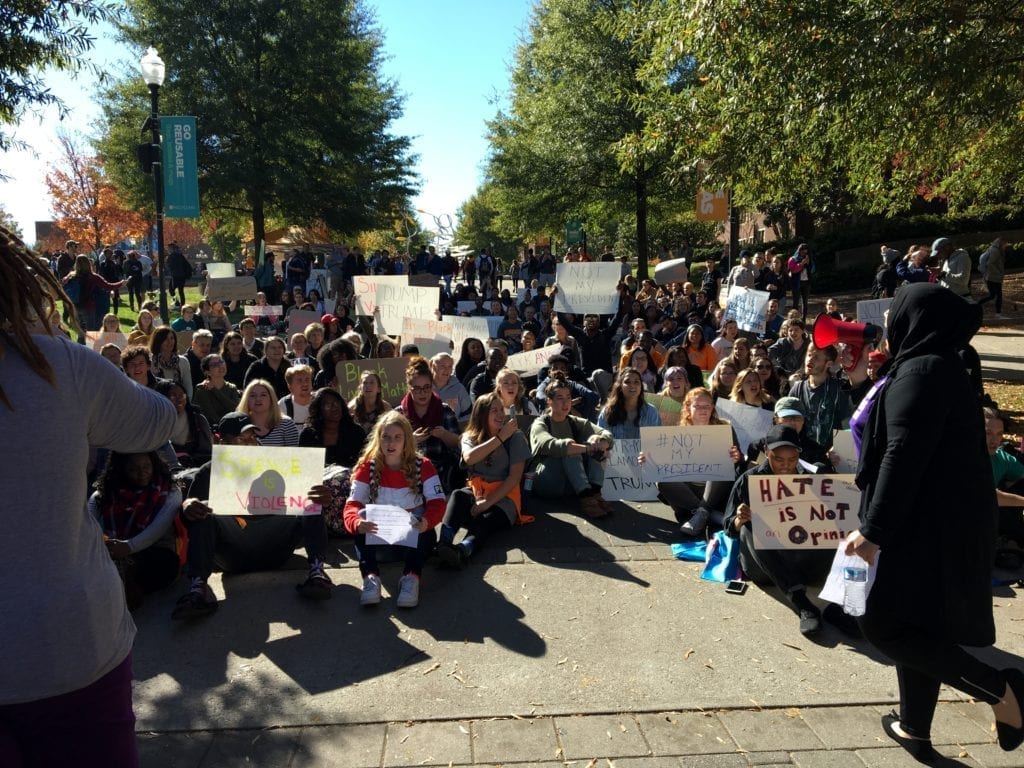UT students hold anti-Trump rally
A student led anti-Trump protest began at the HSS amphitheatre and quickly moved to pedestrian walkway on UT’s campus on Thursday, Nov. 10.

Co-written by David Bradford
The UT Diversity Matters Coalition organized an anti-Trump rally at the UT amphitheater that quickly spread to students occupying Pedestrian Walkway in a vocal, yet peaceful protest.
The rally leaders spoke on white privilege, xenophobia, homophobia and anti-feminist rhetoric they see coming from the president-elect, Donald Trump.
Trump supporters arrived to the rally touting American Flags, Hillary For Prison and Make America Great Again hats to form their own protest.
https://www.youtube.com/watch?v=pK-qnSL4bDQ&feature=youtu.be
After the beginning of the peaceful sit-down protest, a number of Trump supporters joined. One brought a portable stereo and played “Donald Trump” by Mac Miller. Another group of supporters began chanting and reciting The National Anthem.
Some commotion broke out between the groups. There was shoving and tension before police arrived to oversee the continuation of the rally.
George Habeib, UT student and an organizer of the coalition, spoke about the continued oppression of marginalized people, a group he identifies with.
“In history, the Republican Party hasn’t really helped people a lot. The issue at hand is white supremacy. As long as that exists, we aren’t going to be free,” Habeib said. “Right now, we are trying to voice that the UT community, the marginalized UT community, has been hurt a lot over the past few years. Especially with this election. We’re trying to emphasize the reason Trump was elected is because of white supremacy.”
“Some people are afraid after the election but this is something a lot of marginalized people have been dealing with since we’ve been born. Trump has just emphasized that. We are trying to unite everyone here because as marginalized people we only have each other,” Habeib said.
He went on to say that people of privilege have to take more action.
“They have to be uncomfortable in their spaces to talk about the issues,” Habeib said.
Habeib said that believing all Trump supporters are racist is a “gray area.”
“There are different levels of racism. Obviously, supporting someone who is a racist is being racist. Being complicit in acts of violence, whether that’s hate speech, or actual violence, or laws that are targeting LGBTQ+ people, or people of color, or Muslim people etcetera. That is contributing to their oppression,” he said.
Jacob Jefferson Williams, a marketing major, was present at the rally on the opposing side. He was dressed as a businessman along with friends, holding an ‘I’m not racist. CNN Lies!!!’ sign.
“I’m here to spread unity and equality. I don’t care who our president is as long as we have equality and people are treated fairly,” Williams said.
Mickey Shelton, a Carson-Newman University political science major, dressed as Donald Trump and insisted he was present at the rally for awareness.
“I’m trying to create awareness right now. Both parties are polarized, both parties are to blame. I think we are similarity fighting against the establishment and I think this party politics stuff needs to go,” Shelton said. “We need to quit being one side or the other. We need to find common ground and troubleshoot the problem.”
“Both opinions matter. I respect their opinions and they’re telling me mine doesn’t matter. Let’s civilly talk. They say peace but it’s the exact opposite of what they’re preaching right now. At the end of the day we’re all Americans. We just believe in different solutions to the same problem,” said Shelton.
In an attempt to explain the negative interactions between anti-Trump and pro-Trump protestors, Michel Banks, a UT student, said everyone has different opinions.
“If you get angry and you get mad, there’s a veil that goes over your mind. Your instinct is to hit them back or to stop and run away. It depends on the situation you’re in, whether you can articulate the words properly,” Banks said.
“If you have a strong man, like my man was saying over there,” Banks said, pointing to a civil discussion between a white student and a black student, “he’s intellectually strong. That’s why he can have a conversation. That’s why he doesn’t get angry. That’s why when he hears a point that doesn’t make sense, he stops, he thinks about it and then he answers it in a proper manner. That’s because it comes from growth and maturity.”
More updates will be made as information becomes available.
Featured image by McKenzie Manning
Edited by Kaitlin Flippo



